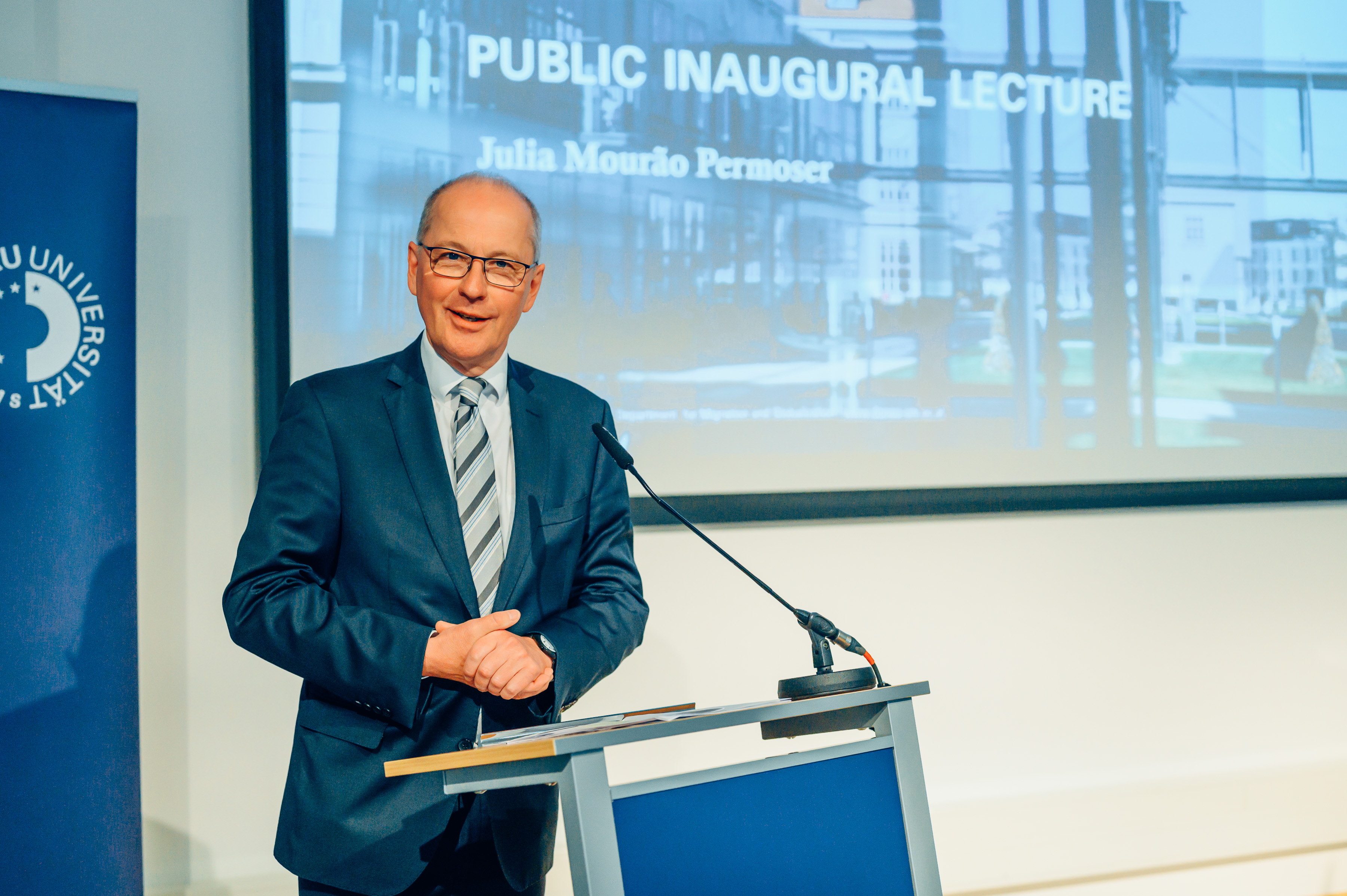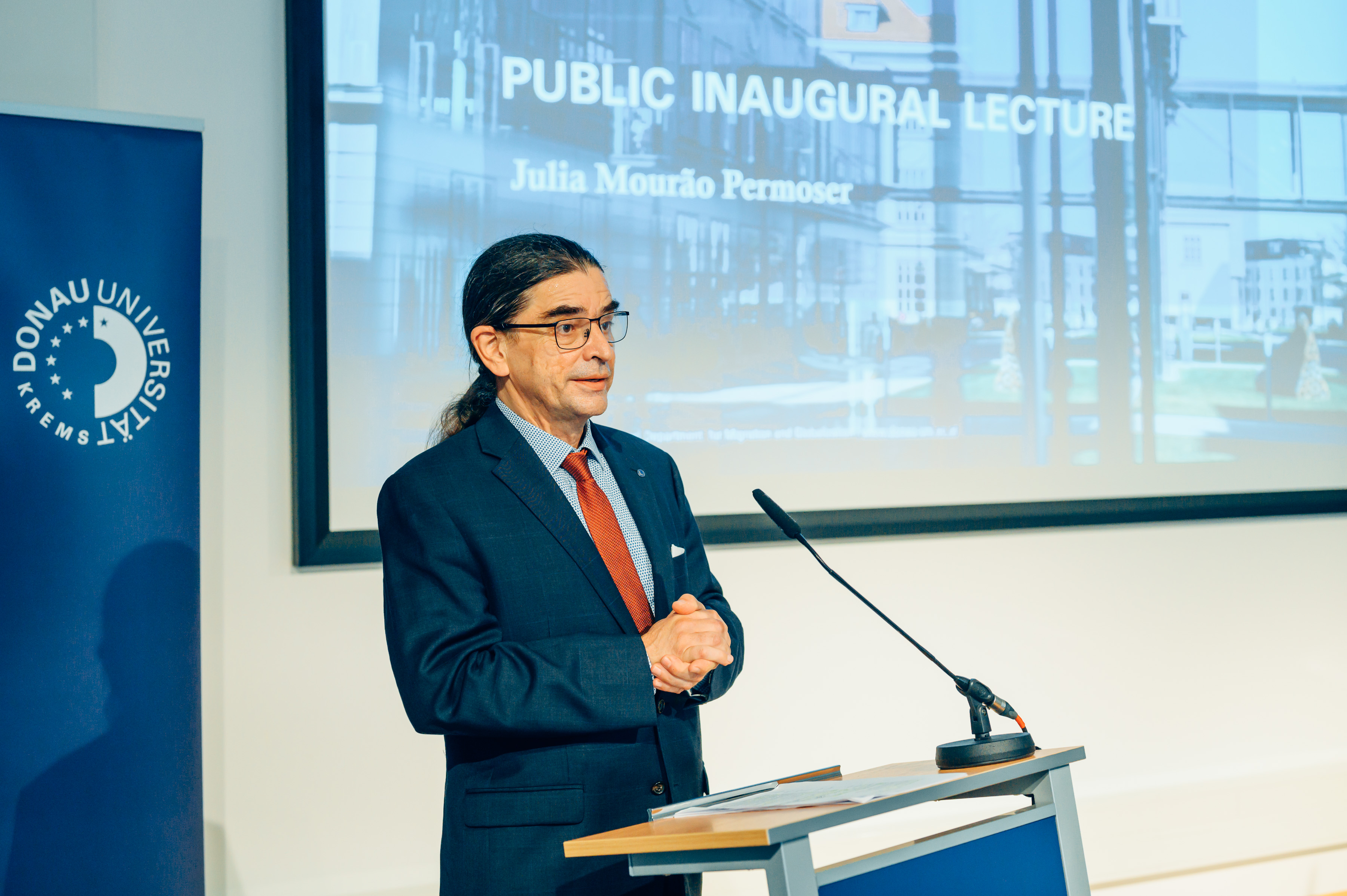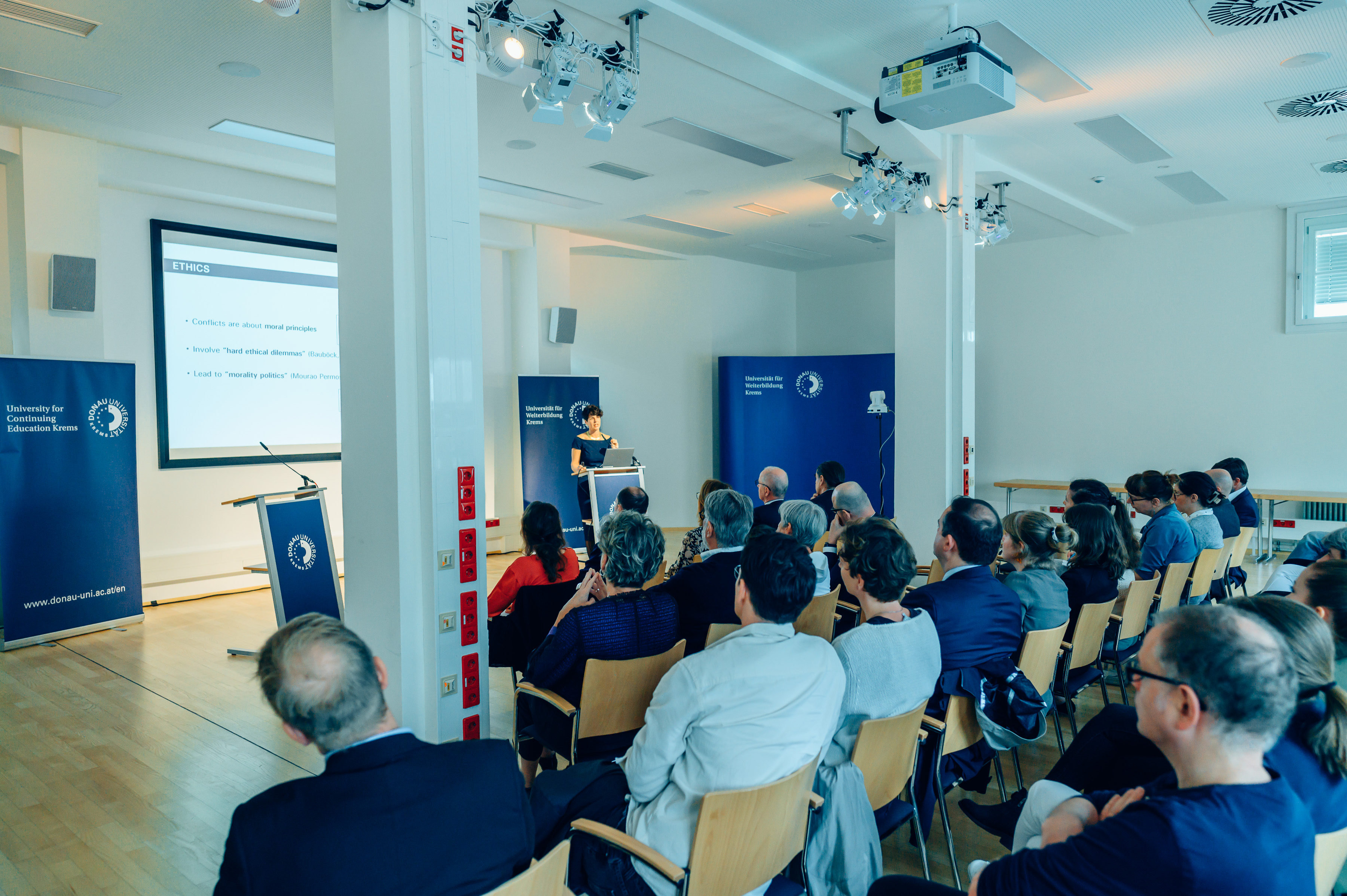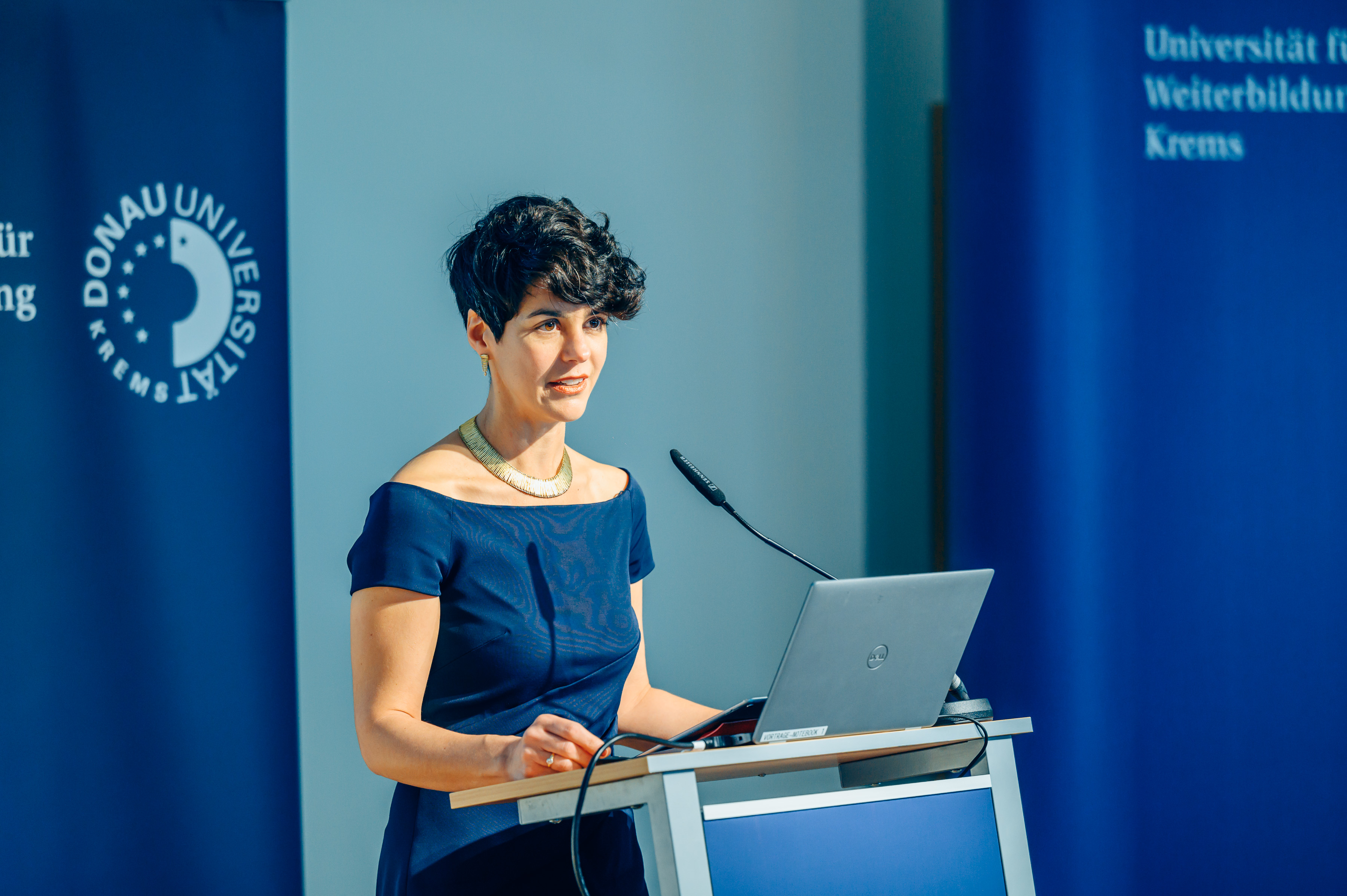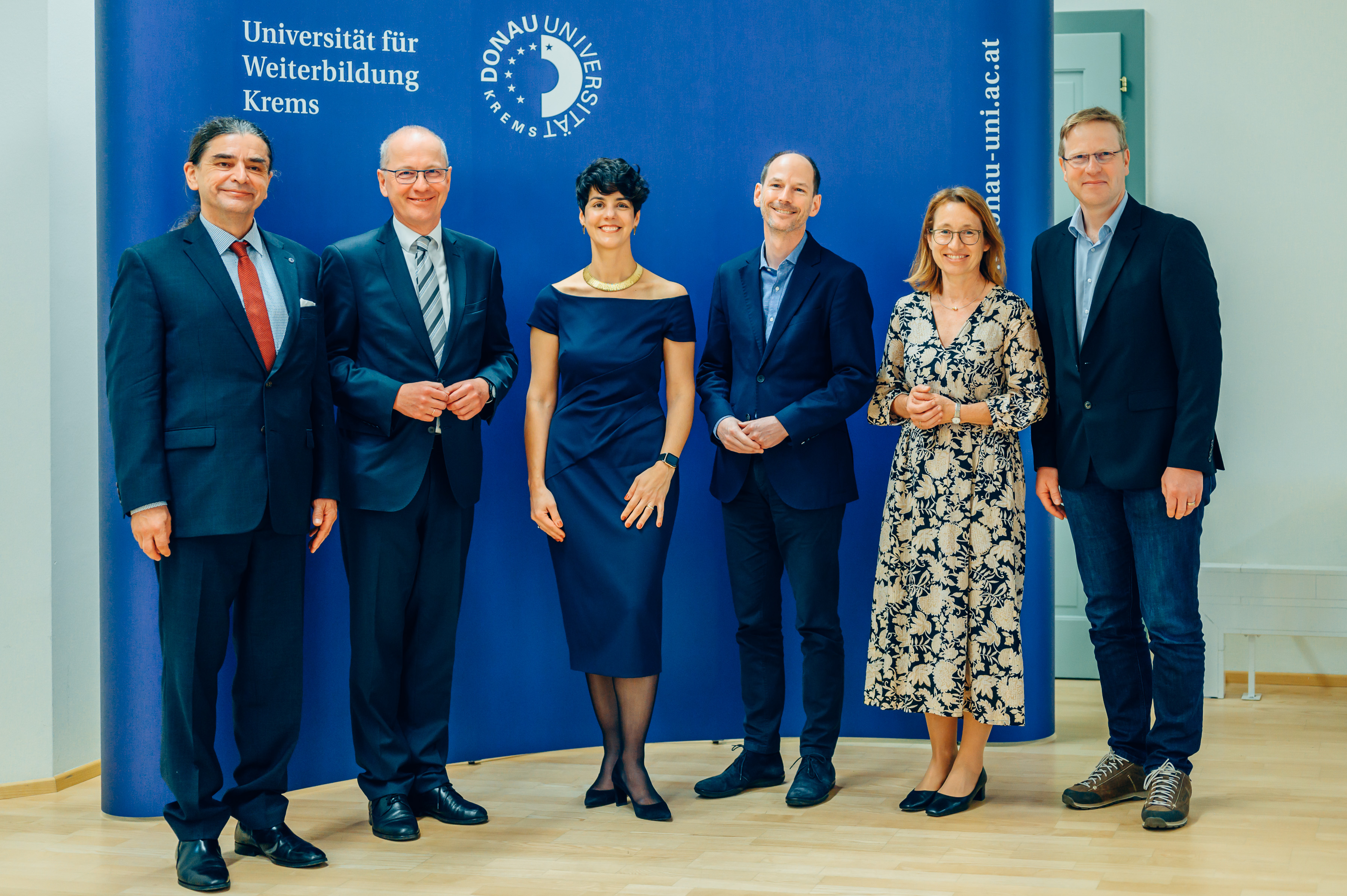In her inaugural lecture on May 7, 2024, Julia Mourão Permoser presented her ideas on how to develop a research agenda on "a political sociology of migration ethics", a central aspect of her professorship. On September 1, 2023, she was appointed as a university professor at the University for Continuing Education Krems for a fixed term of five years in accordance with § 99 of the Universities Act 2002. She researches and teaches at the Department for Migration and Globalisation in the Faculty of Business and Globalisation.
In his welcome address at the inaugural lecture, Rector Friedrich Faulhammer emphasized the important role of the professorship in shaping the profile of the Department for Migration and Globalisation and for the general development of the University. In his introductory remarks, the Dean of the Faculty of Business and Globalisation, Prof. Gerald Steiner, referred not only to Prof. Julia Mourão Permoser’s professional expertise, but also to her international network in the academic field.
Major societal challenges
Mourão Permoser argued that many of the most pressing challenges facing European liberal states with regards to societal inclusion, social justice and democratic citizenship revolve around migration. At the beginning of the 21st century, the liberal democracies of the global West thought they had largely overcome the problem of racism and nationalism, having already put in place several anti-discrimination policies and associated measures to deal with these challenges. However, the growing political polarization over migration and the ubiquitousness of social conflicts over migrants and their integration made it clear that this was not yet the case.
Understanding the core of the conflict
Almost all major issues of migration policy have become highly polarized. One classic issue concerns the question of what constitutes "successful integration" of immigrants. Can integration be reduced to economic independence, or does it also require some degree of cultural assimilation? If cultural assimilation is required, how can liberal states defined by pluralism and by the co-existence of many different sub-cultures legitimately define their own culture and demand adaptation to it, without at the same time jeopardizing their liberal commitments? In her lecture, Julia Mourão Permoser explained the political sociology of migration ethics as a research framework that places societal conflicts over migration at the center of analysis. The aim is to examine the normative foundations behind these conflicts, analyze the type of politics that they give rise to, and assess their impact on democracy.
Resolving conflicts over values
Mourão Permoser postulates that disagreement about ethical norms is at the heart of many conflicts over migration. When two equally important moral principles conflict with one another in a way that they cannot be easily reconciled, we speak of ethical dilemmas. When policy-makers deal with situations involving such conflicts over values, we are often faced with what political scientists call "morality politics". Morality politics arises when political issues are framed in moral terms, as a conflict between what is "right" and what is "wrong", without any room for compromise.
Analyzing the search and rescue movement
Using a case study from the interdisciplinary project "Migration as Morality Politics: The Contentious Politics of Sanctuary in Europe and the United States", Mourão Permoser illustrated the application of her research approach. The project combines political theory with empirical social science research. The project examines three types of sanctuary: church sanctuary, sanctuary cities and civil-society-led search and rescue operations.
The search and rescue movement developed as a reaction to the withdrawal of state rescue forces from the Mediterranean in 2015. It is a movement that has become the target of political hostility and value-based moral polarization. For some, these activists are the last bastion of solidarity; for others, they are criminals who break laws, support the business model of people smugglers, and create a "pull factor" for further migration.
Externalization of borders
Migration policy in Europe is increasingly characterized by a phenomenon that scholars have termed "the externalization of borders". Externalization refers to a process by which states create spaces in which they can act without being accountable to courts, to international and national law, and to the public. Probably the best known example of externalization is the Guantánamo Bay Naval Base, a US Navy base in Cuba. In the Mediterranean region, externalization takes the form of involving third countries in the enforcement of European border control measures. This allows European states to evade responsibility for potential asylum claims and to avoid being held accountable for human rights violations when migrants are intercepted by third parties.
The rescuers' perspective
In this context, members of civil society engaging in search and rescue are faced with a dilemma. Their moral conscience compels them to become active and rescue people whose lives are at risk at sea. If they do not engage in rescuing activities, they would be acting against their consciousness. However, if they do engage in rescue activities, they might also end up acting against their moral principles. On the one hand, rescuers run the risk of indirectly supporting a criminal system of exploitation of migrants by smugglers. On the other hand, rescuers are often even more concerned about their possible involvement in abusive practices and unjust policies of European states. For example, if state authorities ask them for the location of boats in distress, they know that, while they are obliged by law to provide this information, by providing it they may become complicit in human rights violations because European states, once in possession of this information, will very likely forward it to the Libyan Coast Guard, instructing it to intercept the boat and forcibly return the people to Libya. Thus, when NGOs pass on information about the people they have rescued, there is a risk that this information will be used against them, reducing the chances of people being rescued and granted asylum.
NGOs using extraterritorial spaces
NGOs respond to these dangers with a mirror image application of the principle of externalization. They try to avoid becoming involved in any form of immigration law enforcement. While legally the ship is a highly regulated site, in practice, the NGOs do all they can to try to transform the ship into a kind of "floating sanctuary", i.e. as a where only human rights apply, while state sovereignty is temporarily held at bay. In this context, Mourao Permoser speaks of a strategy of "counter-externalization".
Relevance of the research agenda
For Mourão Permoser, the idea of a "political sociology of migration ethics" is relevant in four ways: It represents a bridge between empirical research and political theory, contributes to a better understanding of social and political conflicts, creates knowledge that is relevant to politics and activism, and deconstructs overly simplistic narratives. This refers to narratives that attempt to negate the reality of ethical dilemmas. A research agenda that uncovers the normative conflicts behind seemingly simple questions could help to counteract such polarizing discourses and thus contribute to an improved process of democratic decision-making.
Science communication also plays an important role in Mourão Permoser’s professorship. One example of this is the project "DILEMMAS - The ethics of migration policy dilemmas", co-created by Mourão Permoser, through which Professor Mourão Permoser and her colleagues promote dialogue among scholars and between scholars and stakeholders, including policymakers, NGOs, international organizations, and other actors in the field. More information about Mourão Permoser’s projects and publications can be found here: https://www.mourao-permoser.com/.
Contact
Tags
